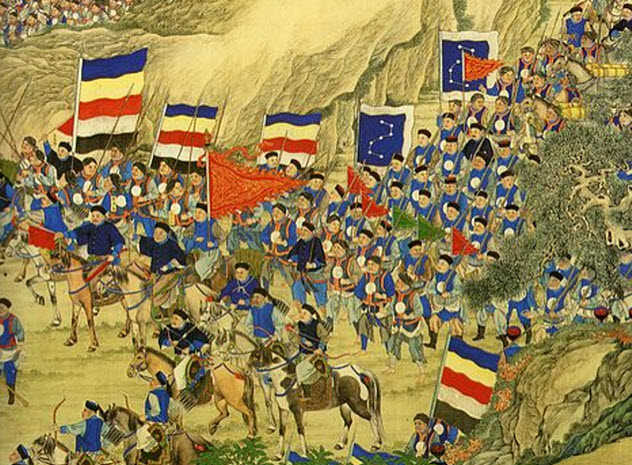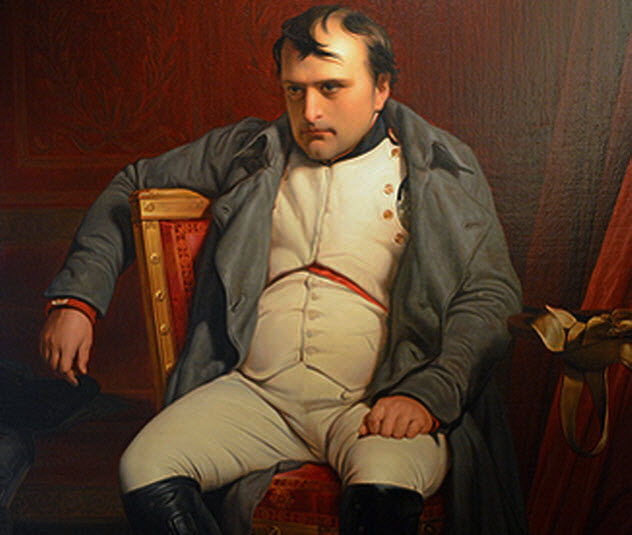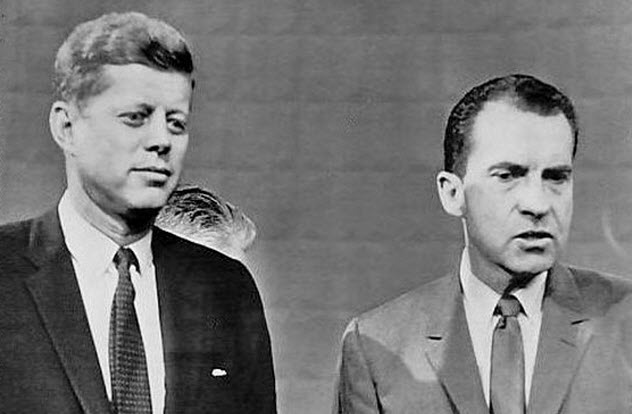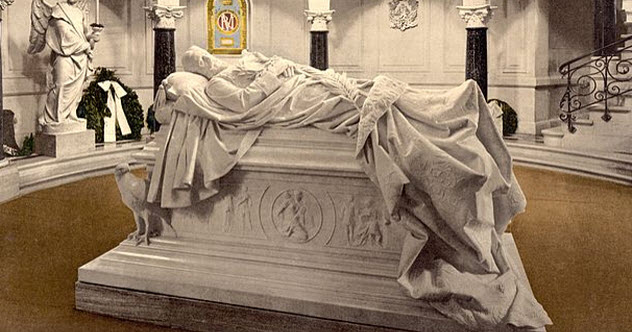 Weird Stuff
Weird Stuff  Weird Stuff
Weird Stuff  Health
Health Ten Confounding New Inventions from the World of Biomedicine
 Creepy
Creepy 10 Death Superstitions That Will Give You the Creeps
 Movies and TV
Movies and TV 10 Movies That Get Elite Jobs Right, According to Experts
 Weird Stuff
Weird Stuff 10 Times Real Laws Were Based on Bizarre Hypotheticals
 Animals
Animals 10 Inspiring Tales of Horses Being Human
 Mysteries
Mysteries Top 10 Haunting Facts About the Ghost Ship MV Alta
 History
History 10 Surprising Stories About the Texas Rangers
 Humans
Humans 10 Philosophers Who Were Driven Mad by Their Own Theories
 Miscellaneous
Miscellaneous 10 Video-Game-Worthy Weapons and Armors from History
 Weird Stuff
Weird Stuff 10 Warning Labels That Exist Because Someone Actually Tried It
 Health
Health Ten Confounding New Inventions from the World of Biomedicine
 Creepy
Creepy 10 Death Superstitions That Will Give You the Creeps
Who's Behind Listverse?

Jamie Frater
Head Editor
Jamie founded Listverse due to an insatiable desire to share fascinating, obscure, and bizarre facts. He has been a guest speaker on numerous national radio and television stations and is a five time published author.
More About Us Movies and TV
Movies and TV 10 Movies That Get Elite Jobs Right, According to Experts
 Weird Stuff
Weird Stuff 10 Times Real Laws Were Based on Bizarre Hypotheticals
 Animals
Animals 10 Inspiring Tales of Horses Being Human
 Mysteries
Mysteries Top 10 Haunting Facts About the Ghost Ship MV Alta
 History
History 10 Surprising Stories About the Texas Rangers
 Humans
Humans 10 Philosophers Who Were Driven Mad by Their Own Theories
 Miscellaneous
Miscellaneous 10 Video-Game-Worthy Weapons and Armors from History
10 Times History Changed Because One Person Got Sick
We tend to think of history as important people making important decisions, but far too often, we forget the human part of “human history.” Humans get sick, and humans make history. Every once in a while, those two overlap.
10 Gone With The Wind Was Written To Kill Time While Healing An Ankle Injury

Now considered one of the greatest books and movies of all time, Gone with the Wind is an American classic. Historians believe that it has literally changed how we view antebellum history.
However, it would not exist if Margaret Mitchell had never developed arthritis in her ankle. Unable to move, she became an insatiable reader. Her husband had to drag all of her library requests home every day.
He eventually got sick of continually bringing her books, so he brought her a typewriter. He wanted her to entertain herself by writing a book. Jokingly, he said, “Peggy, if you want another book, why don’t you write your own?” That manuscript became Gone with the Wind.
Margaret Mitchell had never wanted to write a book. When friends came by, she would hide the manuscript as pillows or put it under the rug. By 1929, her ankle had healed and the book was finished. She had no intention of publishing it.
In fact, it wasn’t until 10 years later that the book was published. She got the push after a friend laughed at the idea of Margaret Mitchell ever writing a book, saying “Imagine, anyone as silly as Peggy writing a book!”
9 Farts Drove Hitler Crazy

Adolf Hitler suffered from meteorism, a fancy way of saying that he farted a lot. To solve it, Hitler saw a lot of doctors who tried different diets, but none worked. In 1936, Theodor Morell successfully cured his farting. His prescriptions were helpful but led to Hitler’s demise.
To treat his flatulence, Dr. Morell prescribed “Dr. Koester’s Anti-Gas Pills” and weekly injections of amphetamines. These did help to make Hitler’s farts less stinky, but the pills contained extracts of strychnine and atropine.
The key ingredients of those pills were belladonna and strychnine. Belladonna is a poison that causes excitement, confusion, and hallucinations. Strychnine causes agitation, apprehension, fear, and restlessness.
Starting in 1940, Hitler took 20 of those pills every day. He also took daily injections of amphetamines and cocaine. The effects on his nervous system are incalculable. Common symptoms include delirium, violent outburst, paranoia, and hallucinations.
While high on meth, Hitler berated Mussolini at their last meeting in 1943. This meeting severed an already strained alliance. As the war progressed, Hitler became increasingly insane and aggravated.
By April 1945, Hitler was trapped in the bunker and was a raving meth head. In his last few hours, he took another dose of meth. Aggravation, paranoia, and violent tendencies came to a boil with his suicide.
8 Hong Xiuquan Got Sick, Thought He Was Jesus’s Brother, And 20 Million People Died

Hong Xiuquan is not well-known in the US, but he started a civil war that killed more people than the American version. In fact, both of them happened at the same time—except the Chinese version lasted three times as long and took 20 times as many lives. It also was important in bringing down the Qin dynasty.
All of this started because a disgruntled civil servant had a fever. Hong Xiuquan was fascinated by the Protestant missionaries in China. While reading their teachings, he was suddenly struck by sickness and was unconscious for about four days.
While in a coma, he had a vision that he was the younger brother of Jesus and had been taken up to Heaven to see Him. Hong also saw a bearded man who told him to slay all the demons.
As the other son of God, his cult gained a lot of traction. The teachings of the “Heavenly Kingdom” were also inspired by the fever to kill demons. In fact, the word “demon” became someone who doubted Hong’s teachings. This crazy man got a hot head, and the Taiping Rebellion tore apart an empire.
7 Communism Started As A Skin Rash

Karl Marx’s Das Kapital is one of the most important collection of words in human history. This book directly outlined how communism could work and be implemented. Karl Marx believed that there was a mass conspiracy among the wealthy to suppress the poor.
According to a theory by Professor Sam Shuster in the British Journal of Dermatology, this paranoia was caused by a rare skin condition called hidradenitis suppurativa. Besides boils and pus, hidradenitis suppurativa produces feelings of exploitation and alienation.
Marx associated his physical suffering with the suffering of the poor. The personal turmoil, physical and mental, helped foster a state of mind that conceived of communism.
6 A White Woman Lost Her Voice, And Thousands Of Black People Gained Theirs

As a genre, the blues was influenced by the suffering of the Jim Crow–era South. To best capture this, record companies hired white women to cover the songs. But all of that changed when Mamie Smith recorded “Crazy Blues.”
Mamie Smith holds the distinction of being the first African American to be recorded singing the blues. She was only allowed to do this when white singer Sophie Tucker became ill and backed out of a recording session.
Songwriter Perry Bradford convinced the recording studio that audiences could handle hearing a black person sing a genre that they had created. The song has become a classic, but its real legacy was the boom in African-American recording artists.
For the first time, African-American blues and jazz musicians recorded in mass numbers. This launched an era of music known as classic female blues. Legendary acts like Bessie Smith and Ma Rainey were heard for the first time.
In a decade that saw the rise of Louis Armstrong, Robert Johnson, and Duke Ellington, it is wonderful that Sophie Tucker got sick when she did. Who knows how many wonderful songs and artists we were denied before Sophie became ill and how many more we would have missed if this racist policy had continued much longer?
5 A Torn Groin Killed JFK
In September 1963, President John F. Kennedy’s womanizing proved to be excessive. After a particularly thorough session, he tore his groin muscle. To prevent further damage, he was ordered by his doctors to wear a stiff canvas shoulder-to-groin back brace.
This locked his body in an upright position. With the combination of an old back brace that he always wore, Kennedy was unable to bend over. For any other person, that would cause an awkward gait. But for Kennedy, it proved to be deadly.
When Kennedy was struck by the first bullet in his assassination, he did not lean forward like Governor John Connally. Instead, he remained upright. His rigid posture allowed Lee Harvey Oswald to get three shots in before Kennedy could duck. Both doctors on duty at Parkland Hospital, Dr. Charles Carrico and Dr. Malcolm Perry, testified at the Warren Commission that Kennedy could have survived the wounds from the first bullet if he had not been wearing his brace.
4 Martin Luther Pooped Out A New Religion

The Protestant Reformation began with the writings of Martin Luther. But he actually started this international movement because he was having trouble starting a movement in the bathroom.
Suffering from chronic constipation, Martin Luther spent many hours in solitary contemplation on the toilet. That alone time was where he came up with many of his theological thoughts. It was upon the throne that he first wrote down his “95 Theses,” the document that instigated the reformation.
More importantly, his interpretation of Sola fide was also written on the toilet. The idea of “faith alone” was the first theological difference between Catholicism and Lutheranism.
There are many fecal references throughout his writings, including “shitting on the Devil” and “breaking wind at the Pope.” Aware of the role that poop had played in his life, Luther credits his insights to the “knowledge the Holy Spirit gave [him] on the privy in the tower.”
3 Napoleon Got Hemorrhoids And Lost His Empire

Tragically remembered for the massive death toll that also inspired an ABBA song, Waterloo is one of the most iconic losses in history. The battle becomes even more tragic when you learn that it could have been a victory for Napoleon if he had not had hemorrhoids.
Due to a particularly painful bout, Napoleon could not lead his soldiers on horseback. Even when he was able to communicate with his troops, he gave illogical directions. No longer able to lead, he delegated to the inept Marshal Michel Ney.
A few days before the battle, Napoleon had tried to treat his hemorrhoids. But his doctors had accidentally prescribed an overdose of laudanum, and he was still feeling the effects. He was drowsy and actually fell asleep during the battle.
This forced him to reschedule the battle from 6:00 AM to 9:00 AM and then to 12:00 noon. The delay allowed the Prussians to join the British forces. Wellington himself credits the new army with turning the tide.
2 The First Time That A Door Defeated Nixon

You may already know that a piece of duct tape on a door at the Watergate Hotel brought down Nixon in 1972. Twelve years earlier, another door cost Nixon his first election. Begging the question, what do doors know?
During the first televised debate in presidential history, Nixon’s sweatiness made him look untrustworthy and is generally considered an important factor in the outcome of the election. But the reason for Nixon’s haggard look was a bang on the knee.
Before the debate, Nixon had just been released from the hospital. There, he had spent 12 days on his back after hitting his knee on a car door as he got out of his car. He developed an infection from which it took weeks to recover.
Nixon was still drained of energy when he took the stage. He had lost weight and looked gaunt. Running a fever of 102 during the debate, Nixon sweated in one of the most iconic moments of political imagery. In those beads of sweat, Nixon’s chances of becoming president were wiped away.
1 The Throat That Caused A World War

Under Frederick III’s leadership, the politically volatile German Empire was improving. As many European states were becoming more nationalistic, tense, and imperialistic, Frederick favored constitutional reform, accountability, a more democratic Germany with a strong parliament, and the reluctance to use military force.
However, all of that ended after 99 days. Unfortunately for Frederick and the rest of the world, Frederick died from a treatable cancer of the larynx. The disease was misdiagnosed by Frederick’s doctor three times. Each time, he believed that the lump was benign. If the doctor had treated Frederick correctly, the path to World War I would have been quite different or maybe nonexistent.
When the bombastic Wilhelm took over, he pushed for aggressive diplomacy and territorial expansion through strengthening the navy. He also antagonized Britain by supporting rebels throughout their empire and calling their king “Satan.”
The tense situation in Europe could have been resolved if Frederick had lived just a little bit longer. France and Germany were mending their relationship. Frederick III was one of the few Germans who was respected in France. If Germany had become a constitutional monarchy, Parliament would have restrained Wilhelm and his plans for domination.
When Nate is not licking flagpoles to try to change history, he is a freelance writer. You can send your comments or any chicken noodle soup recipes to his email at [email protected] or other websites he writes for.








